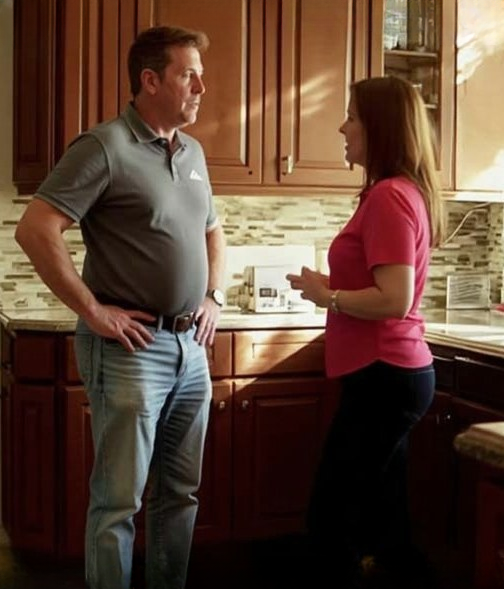When my mother was diagnosed with cancer two years ago, I thought the hardest part would be watching her endure treatment. I was wrong. The hardest part was realizing that the man I married didn’t see her pain — or mine — as anything worth helping with.
Jason and I had been married six years. We weren’t rich, but we got by. He worked as a project manager at a tech company; I worked part-time at the library while finishing my degree online. Our life was quiet: a modest house, a small car, weekends spent gardening or watching movies. From the outside, we seemed happy.
Then the call came from my mother’s doctor.
Sitting on the kitchen floor, the phone pressed to my ear, tomato sauce burning on the stove, I heard: “It’s stage three. Aggressive, but treatable.”
Mom, a retired teacher who raised me alone after my father left, didn’t have much. Her insurance barely covered the basics. When I told Jason I wanted to help pay for her treatment, he sighed as if I’d asked him to throw money into the wind.
“Maya, we can’t afford that,” he said, setting down his fork. “We’re already stretched thin.”
I stared at him. “Stretched thin? Jason, she’s my mother. She needs chemotherapy. We’ll figure it out — cut back, sell some things if we have to.”
He leaned back, expression hardening. “We worked for what we have. Your mom’s been irresponsible with money her whole life. I’m sorry she’s sick, but it’s not our responsibility.”
Irresponsible? My mother had sacrificed everything for me, working extra shifts to pay for my college. She never complained.
I swallowed my hurt. “Fine,” I said quietly. “I’ll handle it.”
And I did.
I took extra shifts at the library, sold my grandmother’s jewelry, and tutored in the evenings. Every penny went to Mom’s treatment. Jason never offered to help — and the silence stung more than any refusal.
During Mom’s surgery, I spent nights in a hospital chair. Jason visited once, for fifteen minutes. “Hospitals make me uncomfortable,” he said on his way out.
By the time she went into remission a year later, I was exhausted, but she was alive. That was all that mattered.
Jason and I, however, had changed. A cold distance settled between us. I suggested date nights, little gestures to reconnect. He always had an excuse: work, fatigue, something. It felt like living with a stranger who occasionally shared my bed.
Then Mom passed suddenly from a stroke.
I was devastated. Jason’s reaction was muted. He patted my shoulder: “I’m sorry, Maya. She lived a good life,” and went back to his phone.
At her small funeral, I handled everything — arrangements, paperwork, flowers. Jason arrived late, polite, like a guest. Something inside me broke.
While sorting Mom’s belongings, I found an envelope with my name, her familiar looping handwriting:
*”My dearest Maya,
If you’re reading this, I’ve gone ahead. Don’t cry too long. You’ve given me more love than I ever dreamed. I’ve left the house to you — it’s not much, but it’s yours. I hope it makes life a little easier. You deserve that.
All my love,
Mom”*
I cried for hours. That modest house was priceless. Every wall held memories of laughter, struggle, and love.
When I told Jason, his eyes lit up. “She left you the house?”
“Yes,” I said quietly. “She wanted me to have it.”
“So… are we selling it?” he asked.
“Sell it? Jason, it’s Mom’s house. I’m not selling it.”
Weeks later, the arguments began. He called agents behind my back, calling the house “our asset.” When confronted, he waved it off: “Just exploring options. Don’t be dramatic.”
Dramatic. That word hit me like a hammer.
I moved into Mom’s house temporarily. Its quiet wrapped around me like a balm. The faded wallpaper, creaky floors, lavender scent — she felt alive there again.
In the attic, I found a metal box with old photos, her wedding ring, and a bank statement: over $50,000 I hadn’t known about.
When I told Jason, he immediately said, “Great! We can pay off the car loan, maybe take that Italy trip.”
“We?” I asked. “Jason, it’s my mother’s money.”
He looked at me like I’d grown a new head. “We’re married. What’s yours is mine.”
Funny. He hadn’t thought that way when she needed chemo.
“No,” I said firmly. “It’s mine to use for her legacy.”
I used the inheritance to renovate the house and start The Iris Project, a literacy program in her memory.
Jason scoffed. “Throwing money away out of guilt. Typical.”
That was it. I knew we were done.
Weeks later, I filed for divorce. The house and inheritance were protected. When the divorce finalized, he called, bitter: “I can’t believe you’re really doing this.”
I breathed. “You mean everything I built while you watched.”
“You’ll regret it.”
“No,” I said. “I’d regret staying.”
Months passed — hard, yes, but liberating. The house now echoes with laughter and stories. I feel Mom beside me, whispering, See, sweetheart? You always had it in you.
One year later, Jason emailed: “I guess I underestimated you. Hope you’re doing well.”
I smiled. I’m doing more than well. I’m free.
At the opening of The Iris Project’s new expansion, I spoke about Mom:
“She taught me love isn’t about what you take — it’s about what you give. And sometimes strength comes from choosing yourself when others refuse to.”
And in that moment, peace settled over me — steady, unshakable, and earned.
